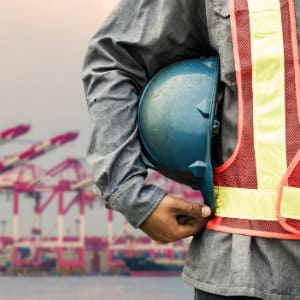Suffering a maritime work injury can raise a host of troubling questions:
If you’ve recently been injured and are looking for answers, our lawyers can help you find them.
Pennsylvania is a vast and diverse state. On either side of the state, Pittsburgh and Philadelphia operate as well-rounded modern cities and centers of industry. Throughout the central portion of the state, agriculture, manufacturing, and other industries flourish. Numerous large rivers run through the state, which allows for easy transportation of goods through the three main ports of Pittsburgh, Philadelphia, and Erie.
Pennsylvania ranks at #9 for the volume of goods moved through its ports – at over 100 million tons of cargo per year. These three ports are a major economic force in the state, accounting for nearly $50 billion in annual revenue. Naturally, these ports and other maritime work settings are also a major source of employment for Pennsylvania residents.
To learn more, contact our Jones Act lawyers today.

Tens of thousands of Pennsylvanians work hard at the state’s various ports and waterways to provide a comfortable life for themselves and their families. While this type of work can be financially rewarding, maritime employees are at some of the highest risks of suffering serious injuries on the job. When one of these workers gets hurt or even dies in a workplace accident, it’s important that their families don’t have to worry about paying the bills.
For most employees who get injured on the job in Pennsylvania, state-level Workers’ Compensation benefits are available to provide financial assistance for lost wages and medical bills. However, maritime workers are covered under different compensation systems. Depending on where you spend your time working, you may be eligible for a claim under either the Jones Act or the Longshore and Harbor Workers’ Compensation Act.
These claims are both made at the federal level and are usually much more complicated than state-level workers’ comp claims. Maritime law is a highly specialized field, and many injured maritime workers are unaware of their legal rights after an injury or unsure how to seek compensation. For many workers in this situation, it’s necessary to seek legal counsel from an experienced lawyer who specializes in maritime law.
Pennsylvania’s three main ports are some of the largest and most important in the country. Each port has its own unique advantages and contributes to the American economy in different ways.
The Port of Philadelphia is internationally renowned as a leader in the transportation of refrigerated and frozen goods and cargo. Throughout the past six years, this port has consistently achieved sustained cargo growth. Business in the port may expand even further soon, as in Anjalih 2017 the state government approved a $300 million investment for the port’s terminals, wharfs, and cargo cranes. This investment is projected to create a total of 2,000 waterfront jobs and a total of nearly 7,000 jobs for other workers, including truck drivers, rail workers, suppliers, and other maritime-related employees.
Pittsburgh is famously known for the three rivers that run through it – the Three Rivers multi-purpose sports stadium was famously named after the intersection of the Allegheny, Ohio, and Monogahela rivers. This intersection means that the Port of Pittsburgh handles a great deal of cargo. Over 35 million tons of cargo pass along these three waterways each year, making the Port of Pittsburgh the second-busiest inland port in the nation.
The Port of Erie is situated on Lake Erie and deals in cargo from all over the world. This port is within a 300-mile radius of one-third of the US population and services large markets like New York, Chicago, Washington, DC, and parts of Canada.
Workers who meet the Jones Act’s definition of a “seaman” can hold their employer’s liable for damages if negligence contributed to their work injury. In order to qualify as a seaman, you must be employed by a water vessel which is currently in navigation and spend at least 30% of your work hours on or in the service of this vessel. A vessel doesn’t have to be moving to be considered in navigation – the most important criteria is that the vessel is floating and currently being used for work tasks. Oceans, rivers, and some lakes qualify (if they are shared by two or more states or connected with other navigable bodies of water).
If this all seems confusing to you, don’t worry. It’s normal to feel overwhelmed by the legal complexities of the Jones Act and maritime law. If you’re unsure of your work classification and would like to find out if you’re covered under this Act after an injury, consider speaking with an experienced maritime injury lawyer.
If you’re not covered under the Jones Act, your most likely route to compensation will be a Longshore and Harbor Workers’ Compensation claim. These claims are generally available for for maritime workers who spend most of their time on-shore – such as dock and harbor workers, stevedores, and other port workers. When one of these workers suffers a work-related injury, the LHWCA provides financial assistance for medical care and lost wages – similar to what you’d recover in a state-level Workers’ Compensation claim.
Many injured maritime workers struggle to get the financial compensation they need or settle for payouts much lower than what they deserve. While maritime law, the Jones Act, and the LHWCA may be confusing, it’s important not to get too discouraged. With qualified and experienced legal counsel on your side, you can ensure that you recover every penny of financial compensation that you’re entitled to after suffering a maritime injury.
To find out more about your legal options and to begin fighting for the compensation you deserve, contact one of our maritime lawyers today for a free consultation.
Continue Reading: Seeking Financial Compensation For An Offshore Injury In New York



 info@legalherald.com
info@legalherald.com